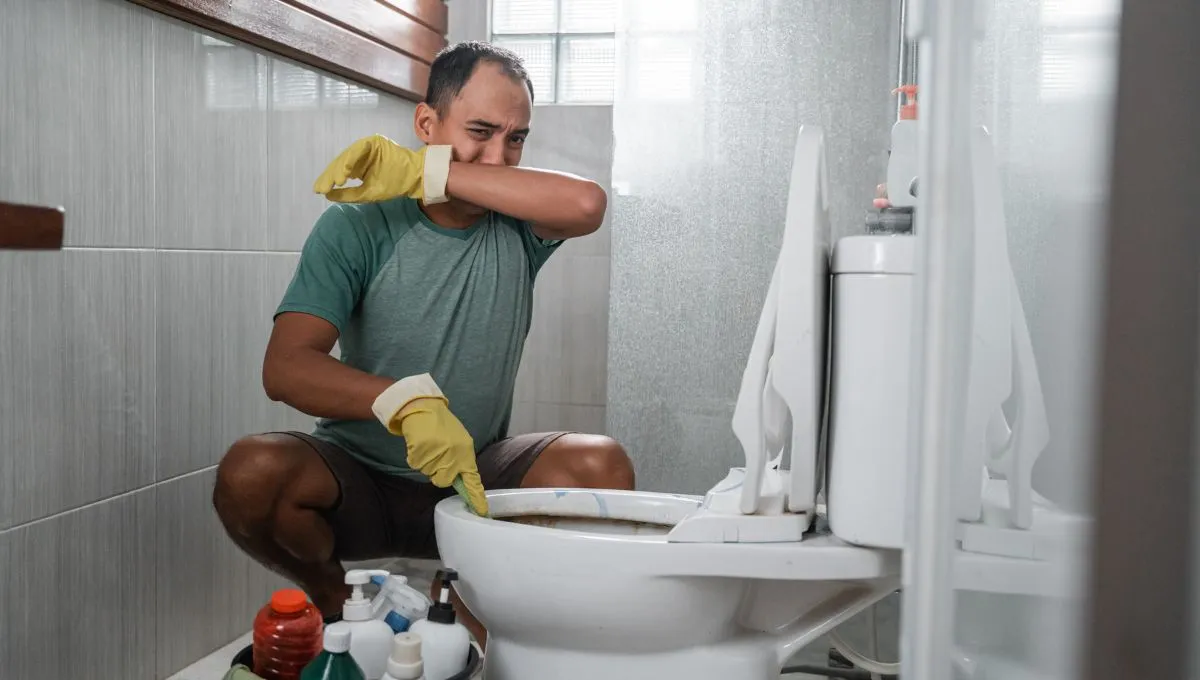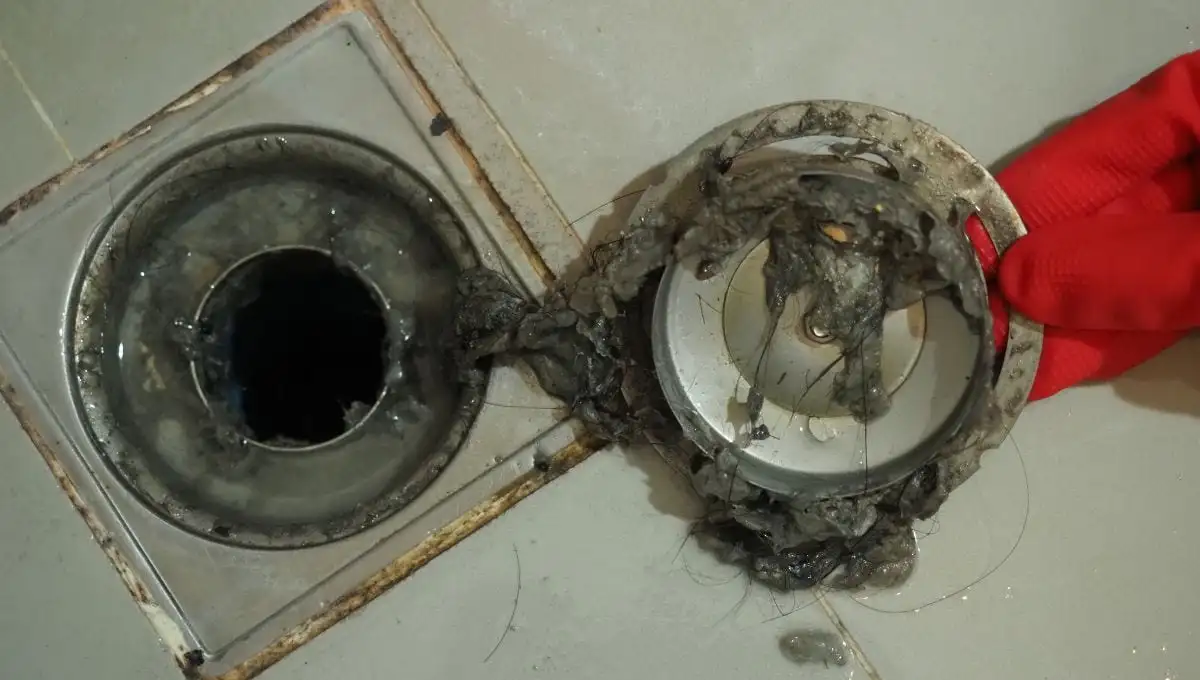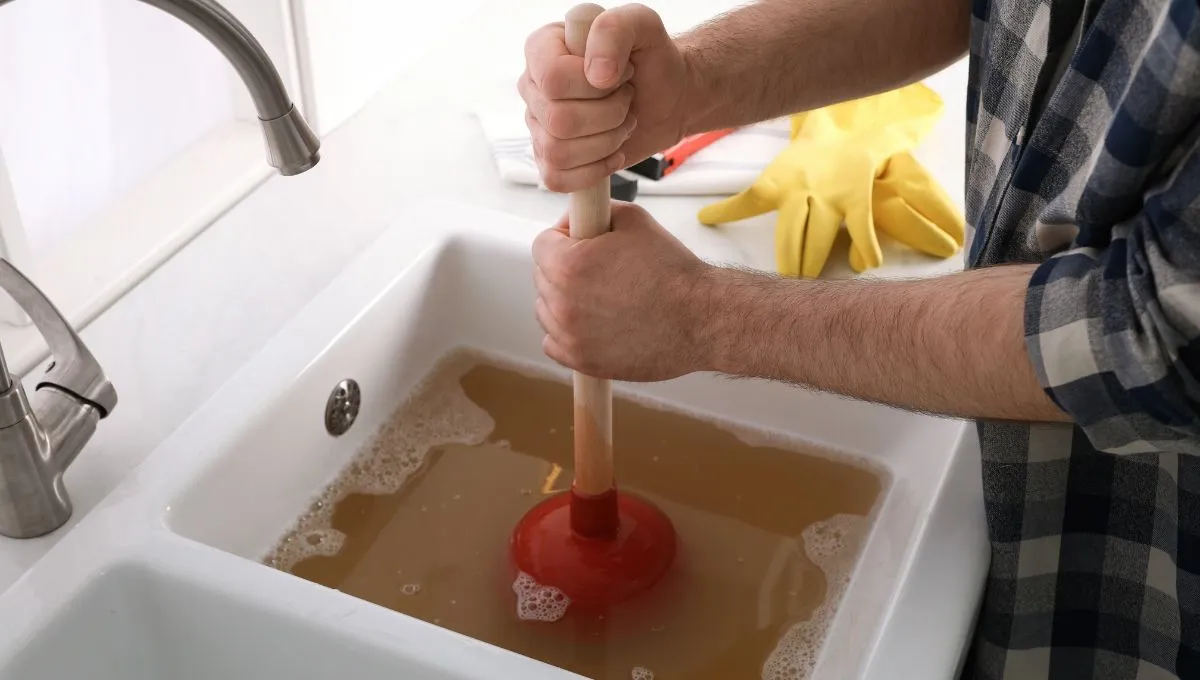
If you’ve ever experienced a smelly drain, you know how unpleasant it can be. Foul odours wafting from your shower drain, kitchen sink drain, or other drain pipes can make your entire home feel less inviting. In Australia, where many homes rely on septic systems, this problem can be particularly common. But don’t worry, tackling a drain smell doesn’t have to be a nightmare. This guide will walk you through the steps to identify the cause, clean your smelly drains, and prevent future drain odour issues.
How to Clean a Smelly Drain: DIY Solutions
Before you call a plumber, you can try several effective DIY methods to eliminate unpleasant smells from your drains. One typical method is to address the source of the odour by thoroughly cleaning the smelly shower drain and its surrounding areas.
A proper P-trap installation and regular flushing with cold water can prevent stagnant water build-up and help keep your drains smelling fresh. However, if DIY methods fail, seeking professional help to diagnose and resolve the issue effectively is crucial.
1. Start with Basic Cleaning
Remove any visible debris like hair, food particles, soap scum, or other residues from the drain opening. A simple pair of tweezers or a drain snake can often do the trick. This will ensure that any cleaning solutions you use can reach deeper into the pipes.
2. Flush with Boiling Water
If your pipes are made of metal (not PVC), carefully pour a kettle of boiling water down the drain. The hot water can help to break down grease and other organic build-ups that may be causing the bad odour. Follow the hot water with a cold flush to solidify any remaining gunk.
3. Try a Natural Solution
A mixture of baking soda and vinegar is a classic natural drain cleaner. If your drain smells like sewage, pour half a cup of baking soda down the drain, followed by half a cup of white vinegar. The mixture will fizz and bubble, helping to loosen debris and neutralise odours. Let it sit for about an hour, then flush with hot water.
4. Consider Commercial Drain Cleaners
If natural methods don’t work to fix a smelly drain, commercial drain cleaners can be effective, but use them cautiously. Some contain harsh chemicals that can damage your pipes or harm the environment. If possible, look for eco-friendly options for cleaning smelly drains. Always follow the instructions on the label carefully.
Want to learn more about drain cleaners? Check our detailed guide on “List of Cleaning Products Safe for Septic Systems Australia.“
5. Deep Clean the P-Trap
The P-trap is the U-shaped bend in the pipe under your sink. It’s designed to trap water, which prevents sewer gases from entering your home. If the P-trap is dirty, it can be a source of foul smells. To clean it, place a bucket under the trap to catch any water, then unscrew the two slip nuts holding it. Remove the trap, clean it thoroughly with a brush, and reattach it.
6. Plunge Away Blockages
A plunger can help to dislodge minor blockages that may be causing the smell. Fill the sink or bathtub with a little water, then use a plunger to create suction and force the blockage through. If you’re dealing with a clogged drain, this may be all you need to eliminate the foul-smelling drains.
7. Introduce Enzyme Cleaners
Enzyme cleaners contain bacteria and enzymes that break down organic matter over time. They’re safe for your pipes and the environment and can help prevent future buildups of bacteria and other odour-causing bacteria. Pour the cleaner down the drain according to the instructions on the bottle and let it sit overnight.
What Causes Smelly Drains?

Understanding the root causes of smelly pipes is key to preventing them. Here are some common culprits:
1. Organic Buildup
Food scraps, fats, oils, and grease can accumulate in your pipes, creating a breeding ground for bacteria build-up and mould fumes. This can lead to unpleasant odors, slow drains, and potentially even pipe blockages that can cause water backups and damage your plumbing system.
2. Hair and Soap Scum Clogs
Over time, hair and soap scum can form partial pipe blockages, trapping debris and causing a musty odour in your bathroom drain smell. This buildup can restrict water flow and create an environment for bacteria growth, leading to unpleasant smells and potential plumbing issues if left unchecked.
3. Bacterial Growth and Mould
Your drains’ warm, moist environment is ideal for bacteria and mould growth. These organisms can produce foul odours and may even pose health risks. Neglecting to regularly clean out the buildup of food scraps, grease, and other gunk in your drains can exacerbate the problem by providing a nutrient-rich environment for these unwanted microbial inhabitants
4. Sewer Gas
If the water in your P-trap evaporates, or there’s a sewer gas trap problem, sewer gas can escape into your home, causing a rotten egg smell. This is a serious issue that requires immediate attention due to the potential health hazards.
5. Blocked Vent Pipes
Vent pipes allow air to enter your plumbing system, helping wastewater flow smoothly. If blocked, negative pressure can be created in your pipes, pulling water out of the P-traps and allowing sewer gas to escape. This can lead to unpleasant sewer odours wafting through your drains, especially in bathrooms with smelly drain issues, and potentially even cause the water in your sewer trap to dry out, further exacerbating the problem.
Curious about wastewater? Check out our comprehensive guide on “Wastewater.“
6. Toilet Paper and Feminine Hygiene Products
These non-decomposable materials can clog your pipes and contribute to sewer line issues. As these items accumulate in your plumbing system, they can create blockages that impede the proper flow of wastewater. Proper disposal of these materials is essential to maintaining a healthy sewer system.
7. Sewer Line Issues
Tree roots, pipe damage from corrosion, or congested stormwater drains can all cause foul-smelling drains and other plumbing problems. Roots can infiltrate pipes, corrosion can create cracks, and clogged drains lead to standing water, allowing unpleasant odors to escape.
8. Plumbing Problems
Leaks, improper installation, and other plumbing issues can also contribute to smelly drains in house. Leaks can allow odors to seep out, while poor installation work can create gaps and cracks that escape unpleasant smells. Addressing these underlying plumbing problems is key to resolving persistent drain odors.
Smelly Drains Prevention Measures

Prevention is the best cure for smelly sink drain issues. Here’s what you can do:
1. Regular Drain Maintenance
Once a week, pour boiling water down your drains (if they’re metal), followed by a baking soda and vinegar solution. This helps keep the pipes clean and prevents organic material from building up.
2. Use Drains and Disposals Wisely
Avoid pouring grease, coffee grounds, or other food scraps down your drains. Scrape plates into the bin before washing, and use your garbage disposal sparingly. This can help prevent a build-up of food particles, grease, and gunk in your kitchen drains, leading to clogs and unpleasant odors if left unchecked.
3. Install Strainers and Hair Catchers
These simple devices can catch a lot of debris before it goes down the drain, preventing clogs and smells. Installing hair catchers and proper drain strainers can effectively keep clumps of hair, food particles, and other gunk from accumulating in your bathroom or kitchen drains. If left unaddressed, this can lead to unpleasant odors, water pooling, and mould growth.
4. Keep a Drain Snake Handy
A drain snake can be used to clear occasional clogs caused by hair and other debris. It can also be useful for addressing more stubborn blockages in your plumbing system before they lead to standing water, sewer odors, and potential mold growth from stagnant, moist conditions.
When to Call Professionals: Signs You Need Expert Help
While DIY methods are often effective, there are times when it’s best to call a professional plumber, especially if you have a septic tank system. Here are some signs you might need professional help:
- Persistent smell despite DIY efforts
- Sewer gas smell (this is a health hazard)
- Multiple drains affected
- Signs of plumbing problems (leaks, gurgling sounds, slow drainage)
- Concerns about your septic system
If you’re experiencing any of these issues, contact a reputable plumbing company like Taylex. We specialise in wastewater system servicing and can diagnose and repair any underlying plumbing problems that may be causing your smelly drains.
Want to dive deeper? Read our comprehensive guide on “What is a septic tank?”
Conclusion
Smelly drains are more than just a nuisance; they can signal underlying issues within your plumbing system or septic tank. The culprit could be anything from a clogged drain plug or smelly bathroom drains to gunk build-up, a mould source within the sewer pipe, or even issues with the council sewer, municipal sewer, or gutters with sewer odours.
While DIY solutions can help tackle minor blockages and odours, persistent or recurring smelly drains may require a professional drain cleaning service. Especially when the problem originates from deeper within your plumbing system or septic tank, a DIY approach may not be enough to address the root cause.
At Taylex, we understand Australian homeowners’ unique septic systems and drainage challenges. With over 50 years of experience, we are the leaders in home sewage treatment systems and can provide expert advice, servicing, and solutions for all your wastewater needs.
If you’re struggling with smelly drains, don’t let them disrupt your life any longer. Contact us today for a comprehensive assessment of your plumbing system and a tailored solution to eliminate those unwanted odours for good.
Ready to breathe easy again?
Smelly Drains FAQs
What are the best things for smelly drains?
A combination of boiling water, baking soda, and vinegar is a safe and effective natural solution for most smelly drains. Enzyme cleaners are also a good option for regular maintenance.
Does vinegar stop smelly drains?
Vinegar can help to neutralize odours and loosen debris in your drains, but it may not be enough to eliminate a strong smell caused by a blockage or other plumbing issue.
Can a plumber fix a smelly drain?
Yes, a plumber can diagnose the cause of a smelly drain and recommend the best course of action. They can clear blockages, repair leaks, and address other plumbing issues that may be contributing to the problem.
What is the recommended frequency for drain maintenance?
It’s a good idea to perform basic drain maintenance, such as flushing with boiling water and using a baking soda and vinegar solution, once a week. Deep cleaning of the P-trap can be done less frequently, about once a month.
Which items you should avoid putting down drains?
Avoid pouring grease, coffee grounds, eggshells, pasta, rice, fibrous vegetables, and other food scraps down your drains. These items can easily clog your pipes and lead to smelly drains.
What chemicals should you not put down the drain?
Avoid using harsh chemicals like bleach, ammonia, or drain cleaners containing lye. These chemicals can damage your pipes and be harmful to the environment.
What stuff clogs drains?
Hair, soap scum, food scraps, grease, coffee grounds, and other debris can all clog your drains. Be mindful of what you put down your drains, and use drain strainers to catch debris before it goes down the pipe.